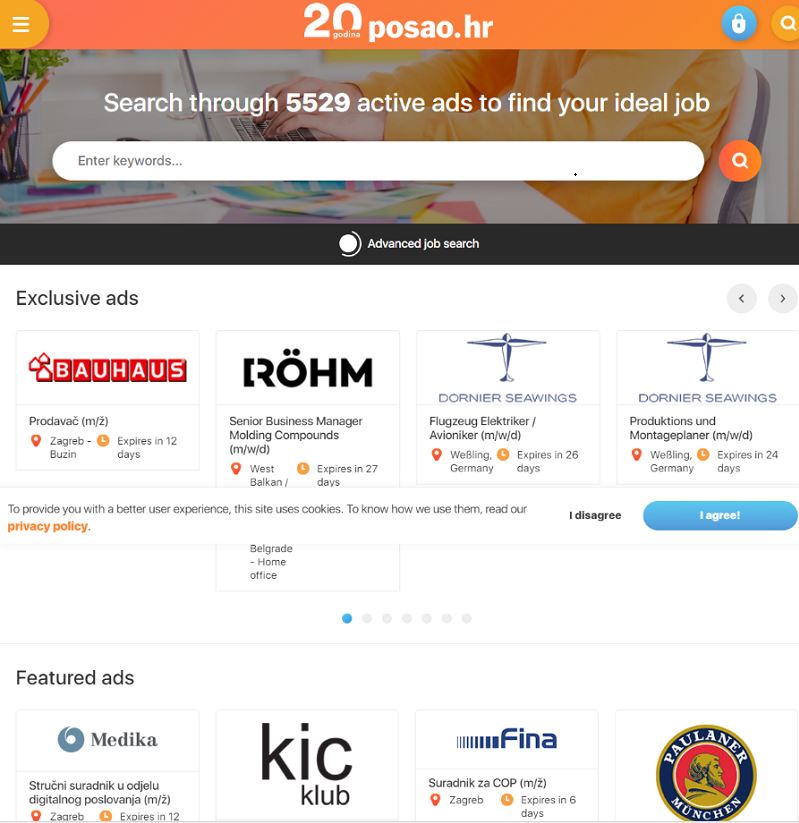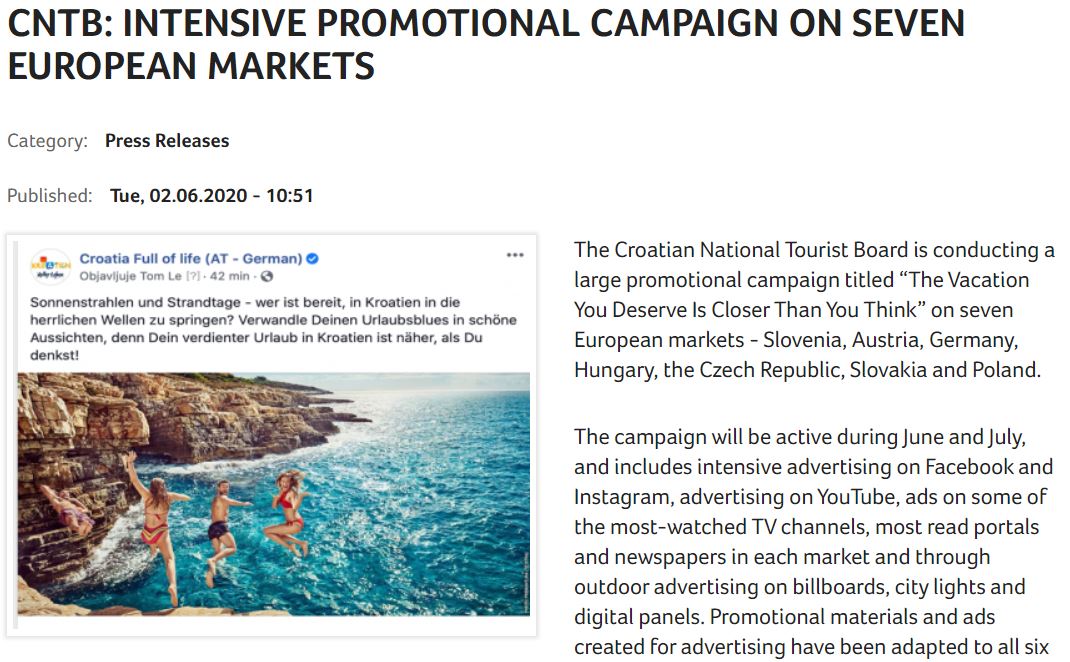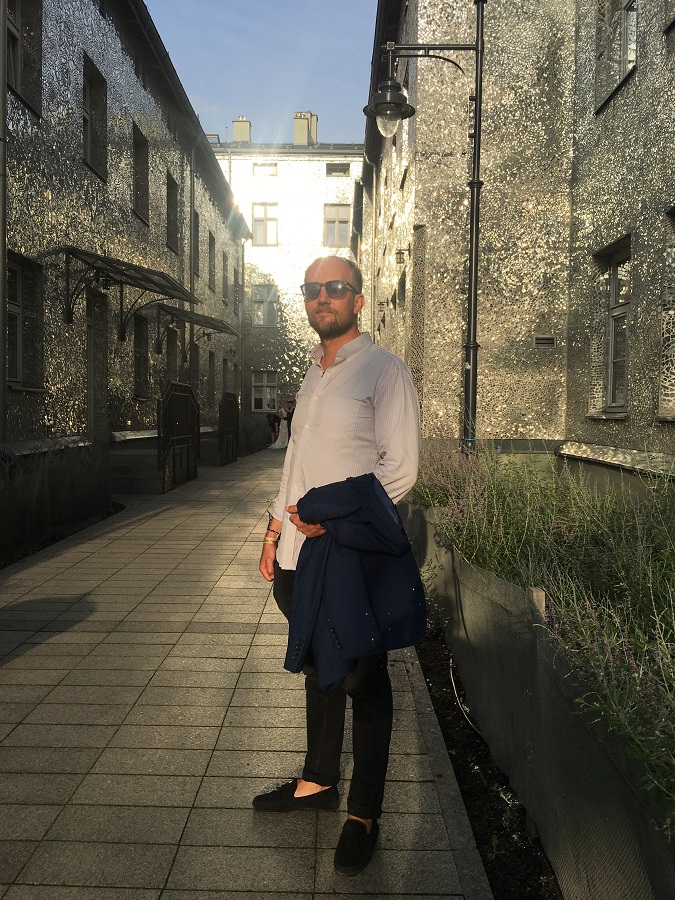Hvar Nominated in 3 Categories in 2023 Travel + Leisure Awards
November 20, 2022 - The international media love affair with the island of Hvar continues, with Croatia's premier island nominated in 3 categories doe the prestigious 2023 Travel + Leisure World's Best Awards.
When I bought my house in Jelsa on the island of Hvar way back in 2002, I had not heard of the island 2 days before I arrived. It looked very pretty, but I had no idea just how pretty. While walking by the harbour, there was a board with a map of the island, on which was written that the island of Hvar was one of the 10 most beautiful islands in the world. I had chosen well.
That famous statement - I heard it EVERYWHERE after that - came from the 1997 Conde Nast Readers Awards, where Hvar made it into the top 10 islands in the world, as it does pretty much every year, sometime (as in 2019) as the number one island in the world.
And it is not just Conde Nast that keeps Hvar in the spotlight - the island features regularly in various Best of lists. And the latest one is one where you can play a part - the 2023 Travel + Leisue World's Best Awards, where Hvar has been nominated in no less than 3 categories:
- Best islands in Europe - Hvar
- Best cities in Europe - Hvar
- Best hotels in Croatia - Sunčani Hvar Hotels, hotel Adriana
Voting is open until February 27, 2023, and there is an extra incentive of cash prizes of up to $15,000 cash, as well as a luxury cruise for two fo those who vote.
You can take part by voting here.
Think you know eveything about this amazing island, or looking to discover more about Hvar? Just as I knew nothing about the island when I moved there, so I was blown away by the incredible things I discovered living there. Put the beaches and nightlife to one side for the moment, and check out 10 things that blew my mind about Hvar after I bought a house there - I am confident that 90% of locals on the island will learn something about Hvar from this video.
****
What is it like to live in Croatia? An expat for 20 years, you can follow my series, 20 Ways Croatia Changed Me in 20 Years, starting at the beginning - Business and Dalmatia.
Follow Paul Bradbury on LinkedIn.
Croatia, a Survival Kit for Foreigners is now available on Amazon in paperback and on Kindle.

'Dani Okusa' Opens as Zagreb County Showcases Its Gourmet Credentials
November 20, 2022 - Good things are happening in the food and wine scene in Zagreb County, with Dani Okusa (Days of Flavours) currently underway and offering a delightful introduction.
One of the many joys of moving to Zagreb last year has been the chance to be able to explore Zagreb County in greater detail. It is a county which is often ignored, but as I quickly realised, one full of several surprises. Who would have thought, for example, that you do not have to go all the way to Istria to hunt for truffles - they are right there in the forests of Turopolje close to Velika Gorica and the airport, and they can be best experienced in the excellent Mon Ami restaurant in Velika Gorica. Want to see what a Zagreb truffle hunting experience is like? Check out our trip in Move Over Istria: the Rise of Zagreb Truffle Hunt Tourism.
The region's wines are also a surprise, most notably the Plesivica region, with its unique micro climate, the spakling wine capital of Croatia. These wines were best showcased in the recent promo video, Taste above All, which has been winning awards from Zagreb to Lisbon. You can see it above.

And the publication earlier this year of the Gault&Millau guide to the restauants of Zagreb and surroundings put the spotlight on some of the excellent restaurants in the county for the first time in a guide in English. Check out the best restaurants in Zagreb County in Around Zagreb: Meet the Top 12 Gault & Millau Restaurants in Zagreb County.
November is an excellent month to explore, as it coincides with the annual Dani Okusa (Days of Flavour) event, which brings restauants from all over Croatia together into a project offering their specialities at promotional prices with fixed menus. The Zagreb County offering, which runs until November 28, was presented this week at the Zagreb County Tourist Board office in Zagreb to the media.
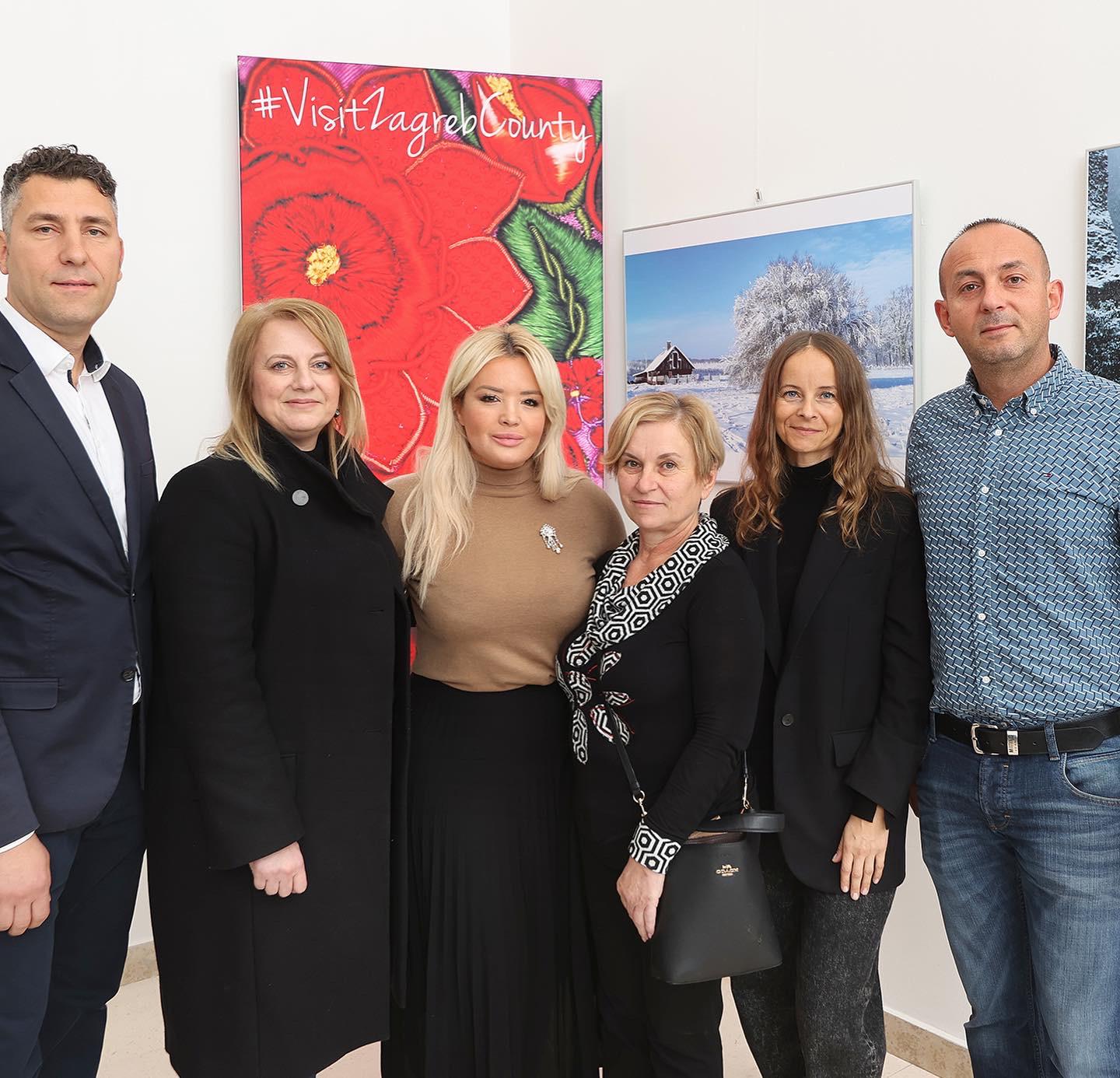
The Zagreb County Tourist Board has presented the program of the third National Taste of Croatian Tradition Days, which will be held from November 18 to 28, 2022.
Angemahtec, wild boar risotto, dumplings, boiled buncek and stewed greens, baked štrukli, young roasted boar, garlic, venison stew, cream cheese, porcini soup, strudel, vineyard soup, Turopolska pig's cheeks are only a small part of the menu in nine restaurants from the area of Zagreb County, holder of the Tastes of Traditions of the Zagreb Region standard, where the National Days of Tastes of Croatian Traditions are held from November 18 to 28 this year.
At reasonable prices, visitors will be able to enjoy two different menus of three courses at prices of HRK 115.00 (€15.26), HRK 125.00 (€16.59), HRK 155.00 (€20.57) and HRK 195.00 (€25.88).
The standard bearers of the Tastes of tradition in the Zagreb area are hospitality establishments: Vinogradarska kuća Braje (Jastrebarsko), Restaurant Samoborska klet (Samobor), Kos-Jurišić Wine Excursion (Sveti Ivan Zelina), Farmhouse Stara preša (Šenkovec), Restaurant Mon Ami (Velika Gorica). and Bistro Babriga (Velika Gorica), and this year Restaurant Ivančić (Jastrebarsko), Krčma "Gabreku 1929" (Samobor) and Izletište Suhina (Sveta Nedelja) joined this year, also holders of the Tastes of Tradition of Zagreb area standard.
"Considering that food and drink in the global tourism market is one of the main motives for travel, a great potential for exploiting synergies and planned development has been identified. Tourists want to get to know the local gastronomy and offer, and thus experience the destination," said Ivana Alilović, director of the Zagreb County Tourist Board, adding that "the Zagreb County Tourist Board is strengthening precisely through the synergy of all stakeholders in the tourism value chain through the third national project Days of Taste of Croatian Tradition developing the concept of food and drink, that is, the strategic approach adopted in the Sustainable Tourism Strategy 2030."
By the way, the national Tastes of Croatian Tradition Days are jointly organized by the county tourism boards in cooperation with local restaurateurs, holders of the Tastes of Croatian Tradition standard, under the auspices of the Ministry of Tourism and Sports. More than one hundred catering establishments from twelve different areas are included in the project.
Looking for a Job in Croatia? This Week's Top 10 from Posao.hr (November 20, 2022)
November 20, 2022 - Looking for a job in Croatia? A new weekly feature on TCN, in partnership with leading job site agency, Posao.hr, who present a selection of weekly job listings.
How hard is it to find a job in Croatia, and what is on offer?
We spoke to Ines Bokan, director of leading jobs site Posao.hr, who kindly took the time for this excellent interview overview.
Ines has kindly agreed to work with us on a new weekly feature on TCN - a weekly selection of 10 job listings, as chosen by Posao.hr. Details and links to the job opportunities below in the latest edition of this feature.
Röhm GmbH is recruiting for the position of Senior Business Manager Molding Compounds (m/w/d). Place of work West Balkan/Balkan Region - Ljubljana, Zagreb & Belgrade - Home Office. Send complete applications via this link by December 15th.
CCPORTER Sp. z o.o. is hiring an employee in the position of Sales Advisor with Croatian (m/f). The place of work is remote - work from home. Send complete applications via link by Nov 23th.
TRESCON Betriebsberatungsgesellschaft m.b.H. is hiring a person in the position of Software Engineer (m/f). Place of work Austria. Send complete applications via link by Dec 04th.
BHS Corrugated strojevi d.o.o. is hiring several positions in Varaždin: (Senior) Developer Control Systems (m/f); Hardwareplaner (m/w), Engineer / Technician (m/w/d) Automation; Software Engineer (m/w/d) IIoT Platform and a Cloud Frontend Developer form IIoT (m/f). Applications can be submitted until Nov 30th by clicking this link.
Dornier Seawings GmbH is looking for a Manufacturing Engineer (m/w/d). Place of work Weßling, Germany. Send applications via link until Dec 14th.
Next Step career network is looking for a Receptionist (m/f) in a luxury resort in Austria. The company offers paid vacation, yearly gross salary starting at 30.000€, 14 yearly salaries, full social benefits package, and much more! Apply here by Dec 7th.
Scalable Global Solutions d.d. is looking for an Application Engineer (m/f/d) in Zagreb! This might be a great opportunity for you if you have strong analytical and problem-solving skills, an independent and reliable way of working, and good communication and team skills. Apply here until Nov 30th.
Strabag BRVZ d.o.o. is hiring a Client Application Engineer – Windows Desktop, SCCM, Packaging (m/f/d) for work in Zagreb. In this position, you can expect diverse and responsible tasks in a challenging environment. Apply here by Dec 12th!
Pfizer Inc is hiring a Healthcare representative (m/f) in Zagreb. For all the details about the job requirements and benefits, click here! Applications can be submitted until Dec 9th.
Eumetsat is looking for a Ground Segment Systems Engineering Team Leader (m/f) based in Germany, in Darmstadt. They are offering an excellent salary, attractive pension, full medical coverage, and much more! All the info is available via this link, and you can apply until Dec 9th.
For more career options and job listings, visit posao.hr.
![]()
These weekly job listings will appear in the weekly TCN newsletter - you can subscribe here.
****
What is it like to live in Croatia? An expat for 20 years, you can follow my series, 20 Ways Croatia Changed Me in 20 Years, starting at the beginning - Business and Dalmatia.
Follow Paul Bradbury on LinkedIn.
Croatia, a Survival Kit for Foreigners is now available on Amazon in paperback and on Kindle.
Croatia, a Survival Kit for Foreigners: 1st Promo in Zagreb
November 18, 2022 - The first public presentation of Croatia, a Survival Kit for Foreigners, took place at the Hocu Knjigu Megastore in Zagreb on Wednesday.
If you think living in Croatia is a challenge, try self-publishing a book.
It is about 4 months since I started writing a series on LinkedIn called 20 Ways that Croatia Changed Me in 20 Years, as I looked to improve my presence on that increasingly relevant platform. Around six weeks later, ably assisted by TCN Editor, Lauren Simmonds, a 256-page book to help foreigners understand the realities of life here, as well as providing lots of practical information about how to negotiate the daily grind, was born.
Writing the book, it turns out, is the easy part...

It all started very well. Uploading to Amazon was simple, and within 24 hours we were in every Amazon store in the world - you can find the book here.
After being let down at the last minute by a Croatian publisher, I decided to self-publish the book. I knew it would not be straightforward, but there was little alternative. And so my journey into the realities of self-publishing began, and I had to find solutions to a number of issues, such as a warehouse space of minimum 5m2 which passed technical inspections for water, electric and sewage. Did you know that you also need a warehouse fulfilling these conditions if you are selling a PDF?
My trusty suitcase carried a maximum of 70 books, and I was to be found wheeling it around the bookshops of Zagreb. The first big delivery was to the Hocu Knjigu Megastore, where Marketing Director Sanja Srdic Jungic has been a heroine from the moment I decided to write a book. A published author in her own right, Sanja guided and advised me through all stages of the publishing and distribution process, and I am very grateful for that.
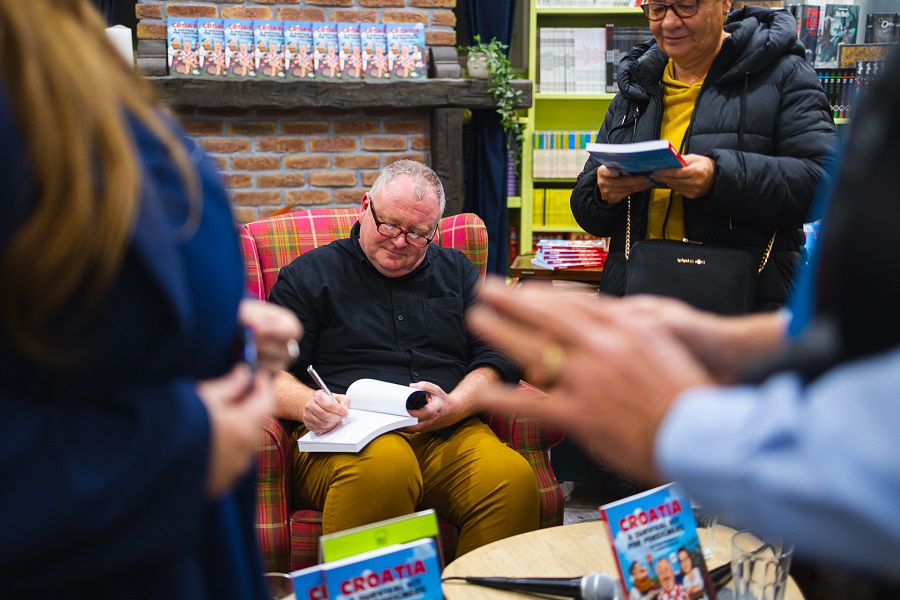
This included offering Lauren and I the opportunity to present the book in the Hocu Knjigu stores around the country, starting with the flagship megastore on Bogoviceva in Zagreb on Wednesday, followed by drinks at Swanky Monkey Garden on Ilica. It was a good turnout and discussion moderated by Sanja.
We will be staging several more book promotion events around the country in the coming weeks. Confirmed so far:
Sunday November 20, Split - Discover Croatia store on Narodni Trg in the Palace at 18:30, with drinks afterwards at Paradiso Bar.
Monday November 21, Zadar - Hocu Knjigu in Supernova Zadar at 18:30, with drinks afterwards in Kafic Twiga.
Wednesday November 23, Split - Hocu Knjigu in Joker Centre at 18:30, with drinks afterwards at The Flag Pub.
Wednesday November 30, Zagreb - International Expats Meetup, powered by Kris at Hotel Dubrovnik (time TBA).
Tuesday December 6 - Osijek - details TBA
Tuesday December 7 - Vukovar - details TBA
We are also hoping to do events in Varazdin, Rijeka, Pula and Dubrovnik - we will publish details as we get them.
Thank you for all your support so far. We have been delighted with the reaction, and you can read some of the Amazon reviews below.
If you would like to order the book online, you can do so here on Kindle and Amazon paperback.
If you would like to order online in Croatia, you can do so here.
The book is also available in book stores around the country at Hocu Knjigu, Skolska Knjiga and Ljevak.
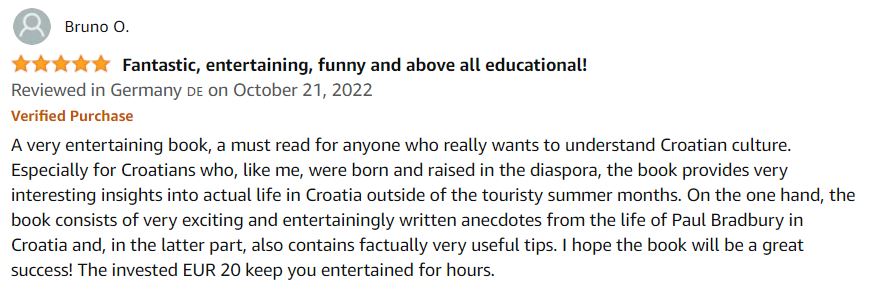
A Week in Croatian Politics - Taxes on Taxes, Drones and Spanish Royalty
This week in Croatian politics, we've had everything from Spanish royalty visiting the country for the very first time to Milanovic insulting the foreign minister, missiles hitting Poland, complaints about taxes being put on taxes and still not actually knowing who dropped a drone on Zagreb back in March.
PM Andrej Plenkovic meets the Spanish king
Andrej Plenkovic met with the Spanish king during the very first visit of the Spanish royals to the Republic of Croatia this week. King Felipe VI of Spain and Plenkovic sat down to discuss economic cooperation, the ongoing energy crisis, migrant policies and Croatia's imminent entry into the Schengen area.
As stated, this was the Spanish royal couple's very first official visit to Croatia, and Plenkovic pointed out that the visit is "a pledge to further strengthen bilateral relations with Spain at all levels, with a special emphasis placed on on cultural, educational and scientific exchange".
A Memorandum of Understanding was also signed between the Croatian Ministry of Science and Education and the Spanish Ministry of Science and Innovation on cooperation in the creation of the DONES Programme, which envisages a partnership between Croatia and Spain in fusion research.
"Projects like this are an opportunity for further cooperation between Croatian and Spanish companies in the high-tech and scientific sphere, they also represent the improvement of economic relations," the press release on the matter stated. Plenkovic was quick to thank King Felipe for Spain's ongoing support in Croatia's entry into Schengen, which is set to occur on the 1st of January, 2023, the same date on which Croatia will officially adopt the euro as its currency.
The pair also discussed current challenges such as the energy crisis caused by Russian aggression against Ukraine and the bloc's migrant policy, which requires a unique European response, as well as the role of the EU in Latin America and in the Western Balkans.
The Croatian Employers' Association (HUP) claims the new tax which was proposed recently will further discriminate against certain companies and work to punish the most successful
''We're shocked by the government's proposal for a new profit tax because it's discriminatory and puts the most successful companies in Croatia at a disadvantage. This is actually the dishing out of a punishment to the most successful companies in this country, the companies that fill the state budget the most, employ the most people, pay the highest salaries and invest the most," said the Croatian Association of Employers, reacting to the introduction of the new profit tax.
"Companies operating here in Croatia don't have extra earnings, this year's profit barely covers losses from previous years, and it's completely unclear as to why the government is doing this. Ahead of us lies a crisis and recession, the depth of which we don't yet know. What we know is that Croatian companies are cancelling orders left, right and centre and that now we need the strength to survive the recession and let people keep their jobs," they warned from HUP.
"This is a proposal to introduce a tax on taxes, which will certainly stop investment in development, which means that there will be no new jobs or salary growth, and we're once again becoming an unsafe country for business and looking unattractive to investors. Along with Hungary, we're the only country that spreads the tax across the entire economy instead of, as prescribed by the European Commission Regulation, keeping it exclusively to the energy sector, which made an unexpected profit thanks to market disruptions caused by the war in Ukraine," announced HUP.
"HUP cannot support the unjustified discrimination of large companies that this proposal brings. On top of that, this tax cannot be introduced retroactively for the year 2022, when investment and employment plans have already been implemented. This proposal will unjustifiably penalise the most successful Croatian companies, the best employers and the largest investors who and they pay the most into the state budget," said Irena Weber, CEO of HUP.
Instead of introducing yet more new taxes, HUP very concretely advocates a full tax reform and stronger work relief through an increase in the personal tax deduction and a reduction in income tax rates. This is the way to strengthen the economy, attract new investments, increase wages and create new jobs, according to them.
Milanovic and King Felipe talk politics while their wives talk healthcare and the prevention of obesity in children
King Felipe VI of Spain and Croatian President Zoran Milanovic are both satisfied with the bilateral relations between the two European countries, while their wives emphasised the importance of preventing obesity in children for preserving the health of the entire population, according to the press releases published after their meetings in Pantovcak.
The Spanish king was on a two-day official visit to the Republic of Croatia together with Queen Letizia, and after the ceremonial reception at Pantovcak, President Milanovic and his wife Sanja Music Milanovic spoke with the royal pair. The Spanish king and the Croatian president both stated that they are satisfied with the bilateral relations between Croatia and Spain, which are two friendly and allied countries, members of the European Union and NATO.
King Felipe and Milanovic also referred to the close scientific cooperation between the two countries, which is particularly marked by the joint partnership in the aforementioned DONES programme, which the Spanish king also discussed at length with Plenkovic.
The meeting also discussed current European and global topics, including the security crisis in Eastern Europe caused by Russian aggression against Ukraine, while their wives discussed the importance of preventing obesity in children.
Sanja Music Milanovic and Queen Letizia of Spain separately discussed innovative approaches to obesity prevention in children in Croatia, Spain and the entire continent. The importance of obesity prevention in children for preserving the health of the entire population was emphasised and the importance of a comprehensive approach to obesity prevention through a multisectoral set of interventions aimed at all periods of life was emphasised, the press release on the topic stated.
Music Milanovic presented the professional and scientific activities she carries out in this area in Croatia and Europe and announced the upcoming inaugural summit of the spouses of European leaders on the topic of childhood obesity prevention across Europe, which she will jointly organise with the European Office of the World Health Organisation (WHO).
The King and Queen of Spain were, as stated, on their very first official visit to Croatia during the year which marks the 30th anniversary of the establishment of diplomatic relations between Croatia and Spain, all with the aim of confirming exceptionally good bilateral relations and providing incentives for their further development.
Croatian authorities still don't know who launched the six-tonne drone which hit Zagreb eight months ago
As news broke about an alleged Russian missile having crossed over into Polish territory, killing two people, our memories return to the drone which struck Zagreb eight months ago. It turns out that the powers that be still have no idea who launched the mysterious drone which crash landed and ended up in pieces.
The Russians are still claiming that the drone which struck Poland had nothing to do with them, saying all those who are claiming it to be Russian are just trying to provoke. Still, we were all shocked and we went from speculating about a Russian attack on Poland, a NATO country, to thinking about the possibility of a third world war to, what is now increasingly likely, finding out that the missile was in fact Ukrainian.
As a reminder, two people were killed after, as Polish authorities then said, a "Russian-made projectile" fell near the village of Przewodow, about 6.4 kilometres west of the Polish-Ukrainian border, around the same time that Moscow forces launched their largest wave of missile attacks on multiple Ukrainian cities in more than a month.
The circumstances of the incident, including information about who fired the missile and from where it was fired, were unknown, which caused possible speculation about Russian involvement in the event and expectations of NATO's next step following the apparent striking of Poland, a NATO member state. But according to US officials, initial findings suggest that the missile that hit Poland was actually fired by Ukrainian forces at an incoming Russian missile.
Three officials told the Associated Press (AP) news agency that the Ukrainians were trying to defend themselves against Russian fire aimed at their electrical infrastructure. This is the event that reminded us of the incident that happened on March the 10th right here in Zagreb, just two weeks after the start of the Russian invasion of Ukraine. Then, a strange Soviet-made Tu-141 unmanned aircraft crashed in Zagreb near the "Stjepan Radic" student dormitory. During the fall, the unmanned aircraft crashed into the ground, leaving a crater behind it.
The circumstances behind it all are still unclear, so Index asked DORH recently if it had ever actually been established who had sent that drone into Croatian territory.
"On April the 13th, 2022, the County State Attorney's Office (DORH) in Zagreb, in the presence of experts, held a press conference where they reported on the results of the investigation related to the crash of the drone.
''At the aforementioned press conference, it was stated that the answers to the questions about where the [unmanned] aircraft came from and whose aircraft it was are under the jurisdiction of other bodies, and not under the jurisdiction of the State Attorney's Office," the answer reads. As for the press conference that DORH mentions in the answer, it was said that the drone had Ukrainian colours on it, but also that it was carrying a bomb. "It was undoubtedly established that it was fragments of an OFAB 100-120 aerial bomb," Major Mile Tomic said in a DORH press release back in April, adding that a lighter was also found.
"During the impact, an explosive device did explode, as was evidenced by the creation of a large crater, the scattering of earth and stones, the ejection of fragments from the crater, as well as traces of tearing and hardening of the metal parts of the bomb," said Ivana Bacic, a chief fire and explosion expert.
"The original aerial bomb should contain 40 to 46 kilos of TNT military explosive, which would be characterised by blackening," Bacic noted.
The Zagreb drone incident could therefore have had horrendous consequences, and yet it seems we're none the wiser. By sheer luck, a real tragedy was avoided. When people say the word 'drone', to many people it sounds like a plastic toy or indeed a type of worker bee, but in this case we're dealing with something that weighs six tonnes and was carrying an explosive on it. It fell in the immediate vicinity of the student dormitory and what could have happened doesn't bear thinking about. In spite of all of that, it is still not known who the drone belonged to, how it was launched, or and why.
Back at that time, the drone event stimulated two debates. First, the question arose as to how much protection NATO provides to Croatia in general.
Before entering Croatian territory, the drone flew over two NATO member states, Hungary and Romania, only to crash in the third NATO member state, Croatia, after seven minutes of flight. In those seven minutes, no one reacted, neither the Armed Forces of the Republic of Croatia nor the Directorate of Civil Protection. NATO did nothing either, and all that lack of action in the then very fresh situation of the shocking Russian invasion of Ukraine and the outbreak of war here in Europe once again.
"NATO's integrated air and anti-missile defense followed the flight path of the object that subsequently crashed in Zagreb. The Croatian authorities have announced that they are investigating this incident," said a NATO official at the time.
Second, in parallel with the investigation, there was a debate about whether the drone really had a bomb on it or not. Defense Minister Mario Banozic and Prime Minister Andrej Plenkovic claimed that there was an explosive device in the drone, while a number of experts disputed this. President Zoran Milanovic was also skeptical about the presence of a bomb in the drone, and he was quick to reproach Plenkovic and Banozic for stoking fears.
Even NATO Secretary Jens Stoltenberg entered the discussion about the explosive device on the drone, and he stated at a press conference that the drone was unarmed. After that, another press conference was called by Prime Minister Plenkovic, who denied his claim, along the way showing photos of parts of the drone that he said belonged to the bomb.
As stated, despite the severity of this incident and all of the potential reasons behind it which are extremely concerning to think about given Russia's actions and the ongoing war over in Ukraine, nobody seems much more in the know then they were back on March the 10th.
Foreign Minister Gordan Grlic Radman says that we will not be training Ukrainian soldiers on Croatian territory
If you recall, Zoran Milanovic was among the loudest in his opposition to this idea, and it seems he is far from alone in his thoughts that supporting Ukraine should be as far as Croatia goes, as we don't want to bring the war to our doorstep.
"I'm absolutely not going to give my consent. Grlic Radman went to Brussels without my prior consent. There are enough of Plenkovic's mini ministers going up to Brussels without the prior consent of the commander-in-chief, and it isn't going to carry on that way. Grlic Radman is nobody and nothing, Plenkovic is actually important here, but he went and pushed himself to the front row like a dumb nerd," Milanovic said about the Minister of Foreign Affairs, once again using another opportunity to sling mud and throw insults around.
Grlic Radman also said later today that there will be no training of Ukrainian soldiers in Croatia, and he remained polite and professional in his wording.
"What Croatia can offer, it will offer. Is it the training of Ukrainian soldiers on our territory? No, no it isn't, it will be on the territory of some other EU member states that have offered. However, the countries in which that might take place still haven't been determined,'' Grlic Radman said in an interview with RTL Danas/Today.
For more on Croatian politics, make sure to keep up with our dedicated section and keep your eyes peeled for our Week in Croatian Politics articles which are published every Friday.
Novi Vinodolski Flooding Raises Cause for Concern
November the 18th, 2022 - Novi Vinodolski flooding is causing cause for concern among many, and although the Republic of Croatia, at least in some parts, is no stranger to floods, the sheer level of rainfall which has caused this was unexpected.
As Poslovni Dnevnik writes, it has been raining fairly heavily and continuously since the early morning hours in parts of the country, and in some locations this has been accompanied by thunder and other stormy weather. A huge amount of precipitation fell on Novi Vinodolski, where some roads were closed, and now Novi Vinodolski flooding is another issue for residents.
In some places, the water is knee-deep.
For more, keep up with our news section.
City of Split to Co-Finance Medically Assisted Reproduction
November the 18th, 2022 - The City of Split is set to co-finance medically assisted reproduction in order to attempt to raise the birthrate in that part of Central Dalmatia.
As Poslovni Dnevnik writes, the City of Split will co-finance medically assisted fertilisation from 2023 onwards, writes Vecernji list, stating that such a pronatal measure has already been introduced by the Eastern Croatian city of Osijek, as well as by the municipality of Gradac in the Makarska littoral.
Many couples try to become parents even after several failed fertility procedures, when they no longer have the right to the procedure of medically assisted reproduction at the expense of the Croatian Institute for Health Insurance, which is a big blow to any normal bank account, so, in an effort to improve the devastating demographic trends in Dalmatia, the city will cover part of the costs of such interventions.
When it comes to demographics in the city and the wider area, the situation is truly alarming. Split has lost 10,100 inhabitants in the last ten years along, and as for the ratio of births and deaths, in the same period, about 3,000 more people died were born.
''We've agreed with Mayor Ivica Puljak that from 2023 on, the City of Split will receive a fund for subsidising medically assisted reproduction. The fund will amount to 600,000 kuna. We will further harmonise the regulations with the mayor before announcing the tender. Otherwise, HZZO covers the costs of four procedures, for women up to 42 years of age. I propose that the City of Split co-finance procedures for women living in Split until the age of 44 or 45, but also to co-finance procedures for couples who have already used all of the procedures financially covered by HZZO, of which there are unfortunately many,'' said Davor Matijevic, a Split city councilor from SDP.
He explained that HZZO pays out in full for four procedures if they are performed at KBC Split (Split Hospital). If those procedures either don't work or result in loss, people seeking such treatments then have to pay for them alone, which is either incredibly difficult or in some cases simply not possible.
For the additional three procedures, the City of Split will co-finance 80 percent of the total costs if the procedure is performed at Split Hospital, 60 percent if the procedure is performed in one of the private institutions in the wider area, and 40 percent (up to 7,500 kuna) for procedures performed in another healthcare institution located on the territory of the Republic of Croatia or even in another European Union member state.
For more, make sure to check out our dedicated news section.
Need a Croatian GP But Can't Get Registered? Here's What HZZO Advises
November the 18th, 2022 - If you've ever been in need of a Croatian GP but just not been able to get anyone to get you on their list because they're all full, you likely know how frustrating it is. Especially if you've already got that dreaded ear infection. Here's what HZZO (the Croatian Health Insurance Fund) advises.
As Poslovni Dnevnik writes, if you want to change your general practitioner, you've found the database of general doctors on HZZO's website, but you only get rejections, you might be left scratching your head. As a rule, the choice of Croatian GP is made according to the place of your residence and the nearest healthcare institution, and you have the right to a new doctor one year after your last choice of doctor if you're unsatisfied.
An insured person (by HZZO) can check if a Croatian GP is taking on new patients in several ways. This information can be obtained at your regional HZZO office in person. You can also contact the e-mail address This email address is being protected from spambots. You need JavaScript enabled to view it., the Croatian Institute for Health Insurance (HZZO) tells tportal.hr. People insured by HZZO can also contact the directorate of health centres in a particular area, and it is also possible to check which GPs have places for enrollment on the HZZO website.
According to the current rules, the minimum number of insured persons who can be assigned to a team in general/family medicine is 1,275, the standard number is 1,700, and the maximum is 2,125 insured persons.
A person's chosen doctor can refuse to take on an insured person only if they have a maximum number of insured persons determined by the general act of the HZZO (for pediatrics 1190 insured persons, for dental health care 2375, and for women's healthcare 9000) under their care already, or, if between the chosen doctor and between the insured person(s) in question, there is a disturbance in mutual relations that makes it impossible to carry out medical treatment.
Insured persons who suspect that they have been improperly refused registration by Croatian GPs can also report the situation to HZZO or to the regional office responsible for their place of residence. In cases of unjustified refusal of patient registration, the competent regional office/area service of the HZZO can carry out an inspection based on the petition of the insured person, and in case of irregularities, it is able to impose the measure provided for in the contract.
GPs and doctors of dental medicine can, on the basis of gaining special approval from HZZO, contract the implementation of healthcare for a new member of an individual family whose family members are mostly treated by that healthcare provider, even in the case when the team has the maximum number of insured persons under their care.
An HZZO insured person can make a change/alter their choice of their chosen doctor by filling in the information on the statement that they can pick up in the office of the doctor they have chosen. The chosen doctor then also enters their data on the declaration form and certifies it with the signature and seal of the healthcare institution or practice in question.
For more, make sure to keep up with our news section.
Diary of a Croatian Lawsuit: Irish Newspapers & Belgian Radio
November 17, 2022 - It is more than 9 months since I have graced the inside of a Croatian courtroom, but Boy, was it worth the wait. The latest instalment of the Kingdom of Accidental Tourism v The Fat Blogger in Diary of a Croatian lawsuit, episode 7: Irish Newspapers & Belgian Radio.
In some ways, I am going to be very sad when my lawsuits from the Croatian National Tourist Board are finally resolved in 2063 or beyond. They add SUCH a surreal touch to an already insane way of life in Absurdistan, the lifestyle capital of Europe, with a sprinkling of Balkan insanity on top. Aka Croatia.
Today, I found myself taking the witness stand to defend myself in a lawsuit due to an article that I didn't write on a portal that I don't own which quoted me. Neither the jounalist nor the portal was sued, no request for a retraction was made, and the article is still live today as published, some 2.5 years later. You can read the article here.
To give you an idea of how I spent my morning, here are three of the questions the prosecution put to me during my cross-examination of almost an hour on the witness stand:
"How many Irish print newspapers did you read in 2020?"
"Do you speak French?"
"How close are you to Minister of the Interior Bozinovic?"
And a hundred other random questions, all carefully recorded for posterity. Perhaps now you can understand why I almost don't want these lawsuits to end.
Another reason that I am in no rush to end them is the excellent time I have with my legendica extraordinaire lawyer, Vanja Juric, who really is a national treasure. After today's 2-hour plus hearing, she confided in me that my case is her favourite case in her portfolio. That really made my day.
As much as Vanja is fun to hang out with (and she really is), she is the model professional and knows how to prepare her clients for the court. She suggested a meeting the day before the hearing.
"Do you remember exactly on which points of the article you are being sued, Paul?" asked Vanja.
It was so long ago, but I had it in the plan to check all before court, but I thought it wiser to let her explain.
The first point was that I was openly critical of the tourist board for only targeting 7 countries in their first campaign during corona, with a press release on June 2, 2020, which you can see above and on this link. If we were trying to attract tourists by car rather than by plane, surely it would make sense to include Switzerland, Serbia and BiH, I argued.
Looking at the press release 2.5 years later, I became even more confused. What was wrong with what I said, that it could cost me 50,000 kuna plus costs and all the distress (ok, I am making the distress up - ever since Vanja took the case, I knew I would be fine).
My second alleged crime was to criticise the tourist board for failing to monitor international media, some of which was putting out incorrect information. When the Irish Times published a story saying that Irish tourists would not be allowed to go to Croatia, I published a story highlighting this as an example of the kind of headline that the tourist board should be on top of. I then went a little further, emailing the editor of The Irish Times with the correct information.
The headline was changed within the hour.
A reader then sent me a link to a similar story in Belgium. I suggested he contact the portal and get it changed. He did and it was.
Two volunteers trying to help, while we have an organisation of 70 full-time employees who are paid to promote Croatian tourism, and nobody noticed. When asked about this in a previous hearing, a tourist board representative informed the court that they pay for a press clipping service, and the problem had been resolved by the time they got their clipping.
Did I feel I was right to criticise the tourist board for not doing their job? Yes. The last time I checked, Croatia was still a democracy, and the right to free speech and voicing an opinion did not normally come with the threat of a 50,000 kuna penalty.
I left Vanja's office feeling much better about taking the witness stand, but a lot more confused and a little angry at why I was actually being sued at all, if these were the two points.
And so the day arrived...
After the prosecution had called two witnesses in the last hearing, now it was our turn. Vanja called the former Communications Director of the Office of the Prime Minister of the Republic of Croatia, Kresimir Macan, and luxury tourism consultant, Zoran Pejovic, who was also quoted in the article - but not sued. Indeed, as we learned previously, I was the only media person that the Croatian National Tourist Board sued in the whole of 2020 - and they sued me twice.
One of the things you learn when you are being sued in Croatia is to expect the unexpected. Will the hearing even take place, or will it be postponed at the last minute? So far, I am into my third calendar year with these lawsuits, and hearings have been postponed no less than four times, often due to the prosecution lawyer double booking his time and then not noticing until shortly before the hearing. Despite having a law practice with no less than 50 lawyers, it seems that my case is so complicated that it can only be handled by one dedicated senior partner.
And so we gathered outside room 219 of the Zagreb Municipal Court for our 09:00 hearing. Zoran, bless him, had woken up very early to get the first flight from Split and then flew back straight after the hearing. It was his first time in the witness box.
09:00 and no sign of their lawyer. Had it been postponed again?
We entered the court only for the judge to say their lawyer had called to say that he was running late, but that the show would go on. And on it went.
First up, Kreso Macan, who gave a very good account of events as they were. As co-founder of the Total Croatia Travel INFO Viber community, as well as having excellent relations with the police and other institutions due to his job and life in the political scene, he probably had the best overall picture of anyone in the country of the situation at the time.
Next up Zoran, for his first taste of Croatian justice close up. Zoran confirmed that he was happy with the way that he had been represented in the article, as well as endorsing my work and then spent a rather surreal few minutes answering questions on how tourists came to Croatia from Ireland before the pandemic - by car, plane or train.
The questions were incessant, and I started to wonder if their lawyer was being paid by the number of questions asked.
Zoran was free to go, and it was my turn.
As the defendant in a case in Croatia, you are allowed to make a statement, and then you are subjected to questions from the prosecution and then from the defence. Even though it was not directly relevant to the charges of the case, I wanted the judge to understand the timeline, as well as to document it for this Diary of a Croatian Lawsuit. Looking back at the timeline more than two years later, it just seems crazier than at the time.
Here we go.
January 25, 2020 - First corona article on TCN.
February 2020 - the start of the TCN Daily Travel Update, documenting borders, air, road, train, ferry, and permit information. It was not long before CNN was linking to this page as the only real source of information in English.
February 25 - first corona case in Croatia.
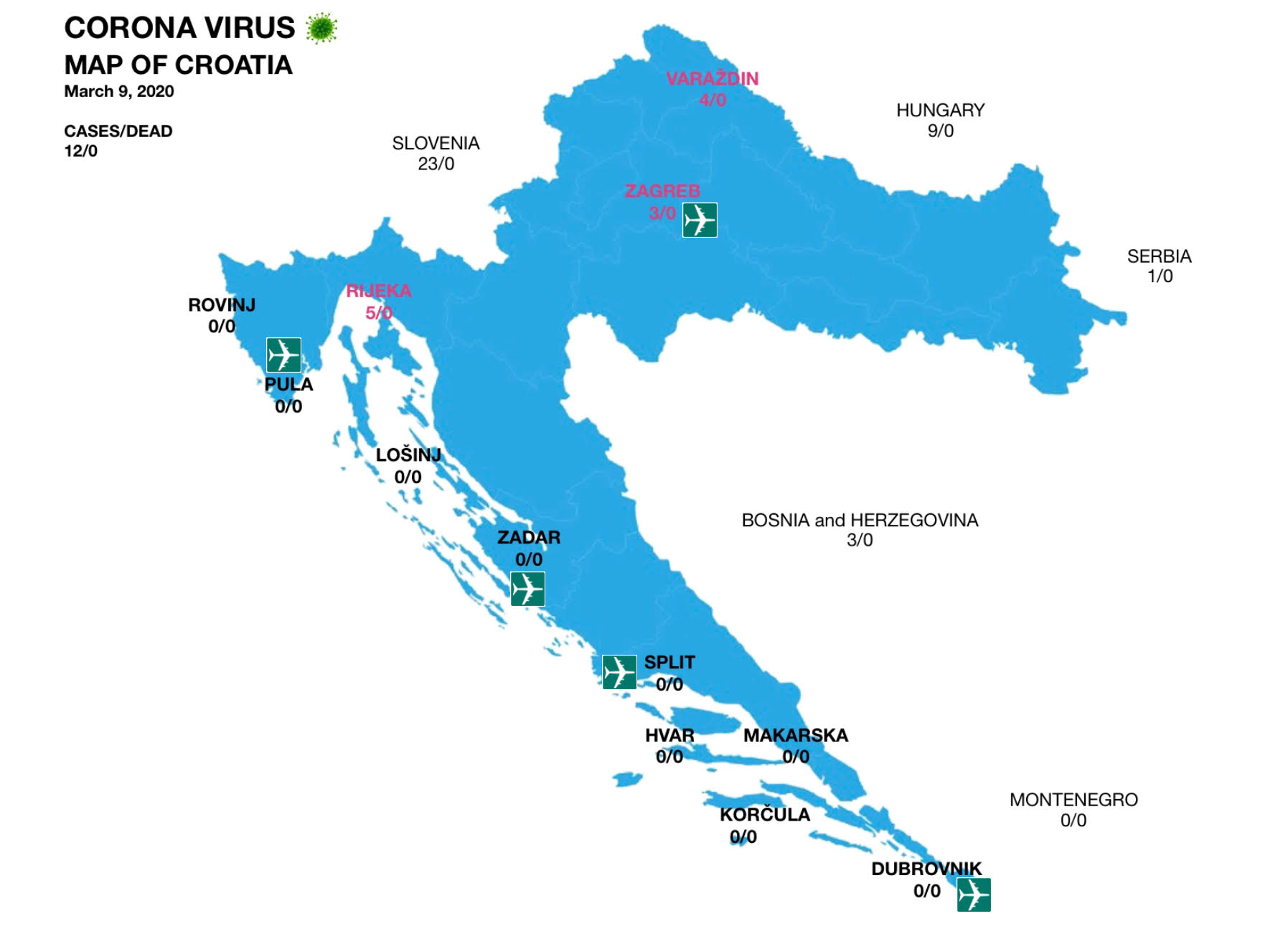
March 9 - first corona map of Croatia, by TCN.
Almost TWO months later, May 6, the Croatian Ministry of Tourism had absolutely NO mention of coronavirus on its website.
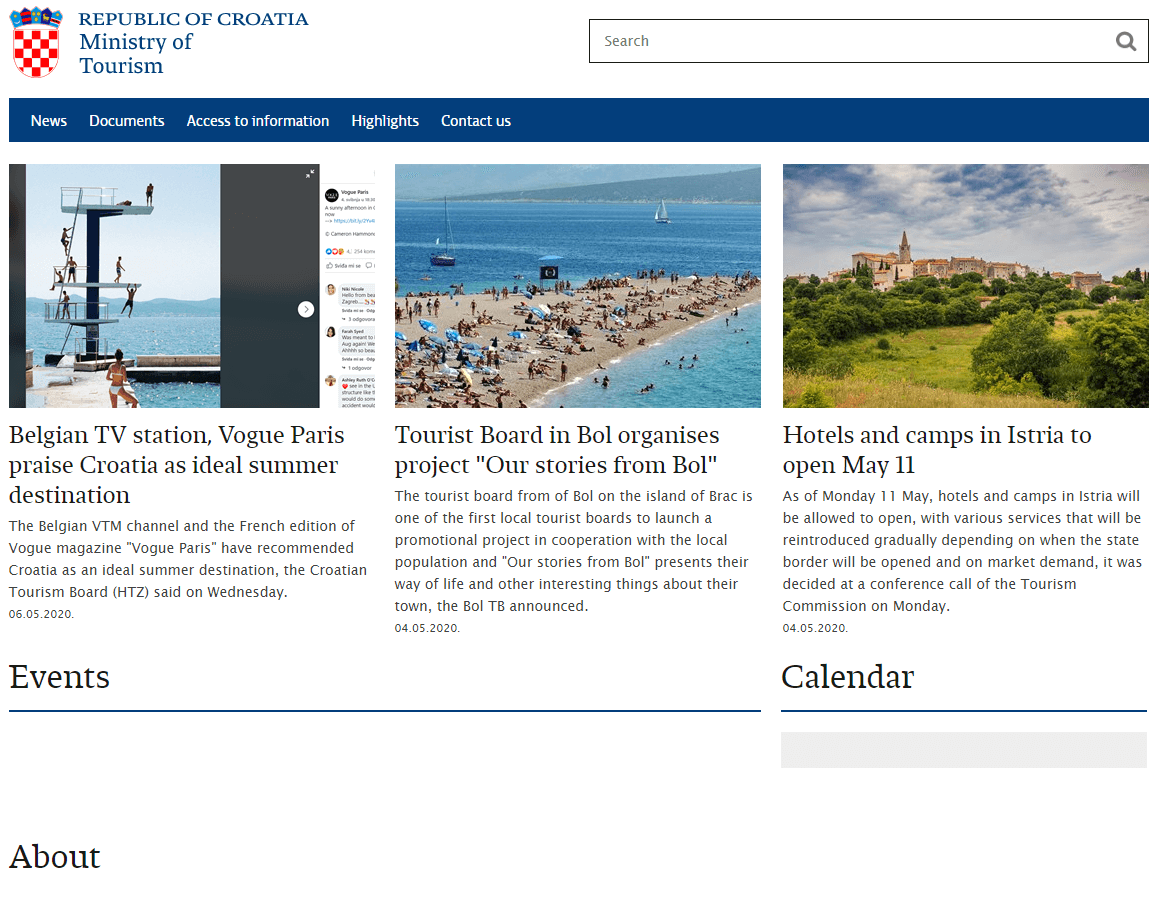
And the corona travel advice from the Croatian National Tourist Board was epic. If you couldn't find what you were looking for in the gobbledygook below, the advice was to email the ministry, not the tourist board. The same ministry where corona did not exist.
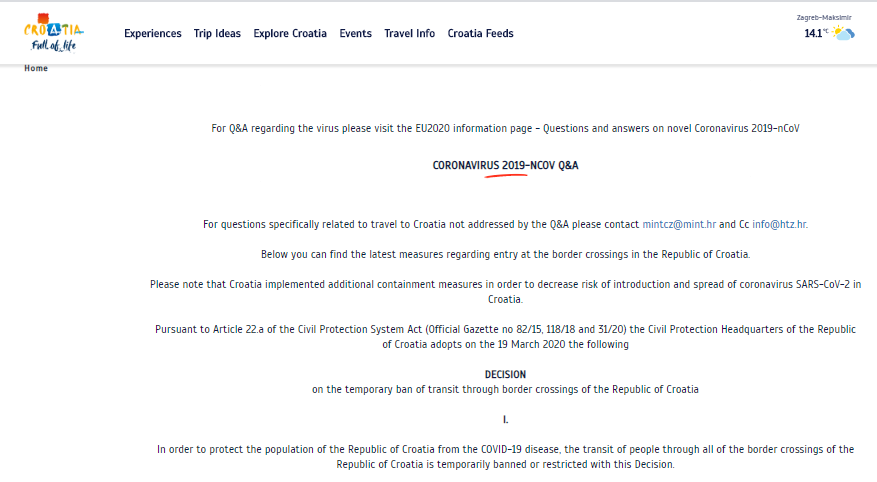
What a difference a few days make, as the Croatian media reported after I wrote an article on the subject.
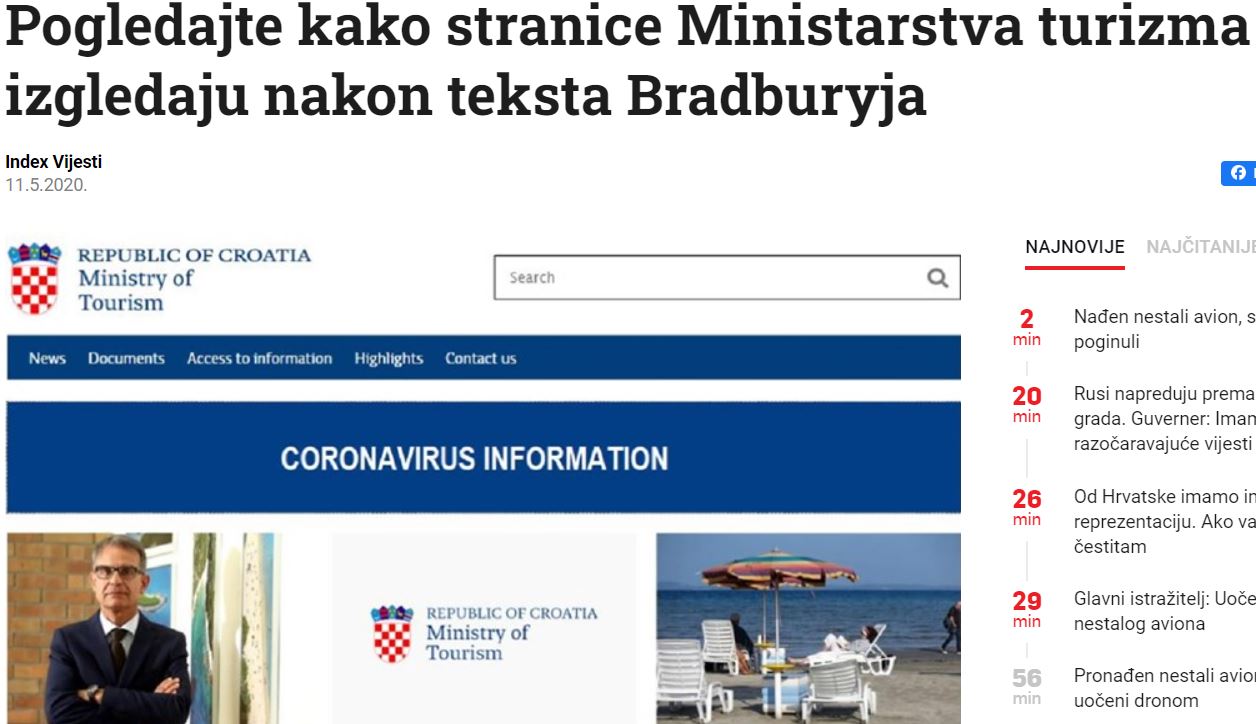
Not to be outdone, the Croatian National Tourist Board upgraded their information to something vaguely useful, as you can see below.
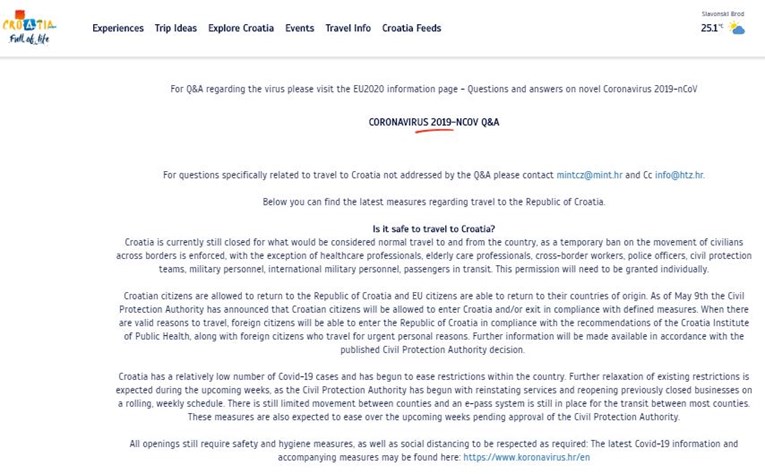
May 13 - Croatia partially reopens, but there is confusion as to who can actually come in, and under which conditions.
May 17 - I suggested to Macan that we go to the Slovenian border to see the situation on the ground. We were shocked to see people being turned back at the border, Slovenian tourists desperate to get to the sea but unaware that they needed a paid reservation. Official information was zero. And so Macan suggested we start the Total Croatia Travel INFO Viber community. It was a project that took up half of my summer, earned me zero kuna, won 7 international awards (mostly for crisis management), and taught me more than any project in my life.
May 19 - The Total Croatia Travel INFO Viber Community is launched.
June 2 - The Croatian National Tourist Board launches its campaign in 7 markets.
June 12 - An article criticising official tourism promotion efforts appears in Index.hr, quoting me.
The blue letters from the Zagreb Municipal Court start to arrive, and the rest is history.
After I finished, the questions began. So many questions. My favourite was
How many Irish print newspaper articles did you read in 2020?
How much news did you watch on Irish TV? Or on Irish radio?
Knowing that I was to be cross-examined on my relationship with Belgian radio, I put it on record for the court that the only media I follow was online media, in an effort to reduce the number of questions.
My assertion that I had an excellent relationship with MUP, with whom we cooperated superbly (MUP was THE only effective tourist info provider at one point, and it was their staff, not the 319 tourist boards that were answering the barrage of tourist questions, with help from TCN and our Viber Community) led to questions of the closeness of my relationship with the Minister, who I have met twice in my life.
My French language proficiency was apparently relevant to see if I had understood the corrected article mentioned above from Belgium. There were lots of questions about my knowledge of the numbers of tourists from certain markets, which borders were open in Croatia in certain months, and many more questions I can no longer recall, but eventually, some two hours after the hearing started, the questions finally stopped.
The judge announced that the case will go into its fourth calendar year, but that there will be a verdict, which will be given on January 13, 2023.
Win or lose, I will see a little less of Vanja, which will make me a little sad, but the highlight of the day remains that I am her favourite case.
Stay tuned for the next episode of Diary of a Croatian Lawsuit. With three active lawsuits against me, there is still plenty to write about. Check out the dedicated section to this madness for the latest.
Croatian Returnee Stories: Tonci Petric, from Stuttgart to Zagreb
November 17, 2022 - Whisper it quietly, but more and more people are relocating to Croatia from the diaspora. In a new TCN series, we meet them to find out how they are faring and what advice they have for others thinking of making the switch. Next up is Tonci Petric, who moved from Stuttgart to Zagreb.
Hi! My name is Tonči Petrić. I am a returnee from Germany. I was born in Stuttgart, the capital of the automotive industry in Germany and the headquarters of Mercedes-Benz and Porsche. Originally, I am from the island of Hvar, where my roots and my family came from. I have now been living in my new home in Zagreb fo 6 years. I am working as a journalist, blogger and news anchor for the national broadcasting company HRT, presenting international news in the German language. In my free time, I produce the podcast Green Deal Hrvatska.
My motto is: “Fill your life with adventure, not things. Have stories to tell, not stuff to show.”
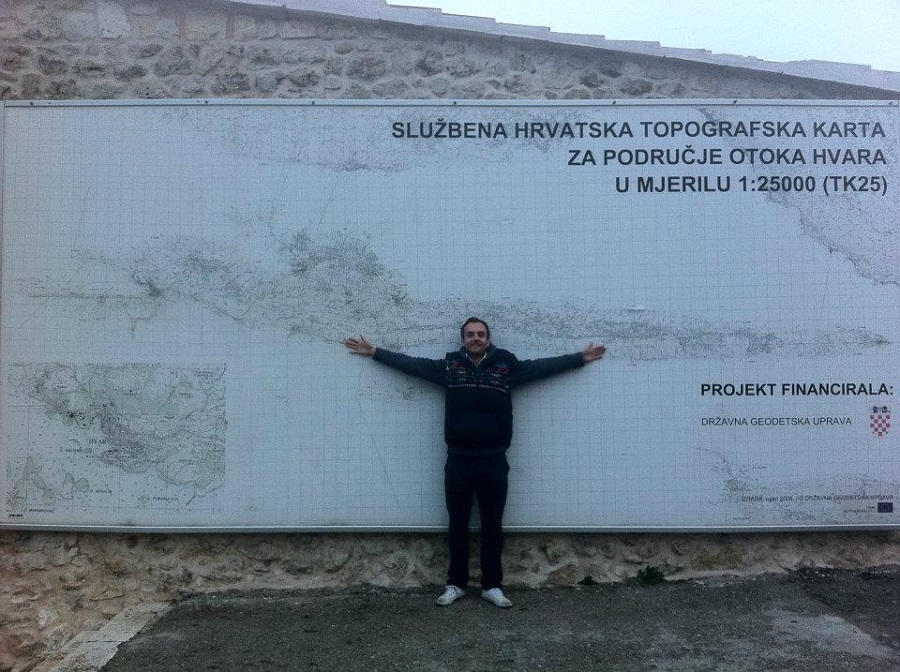
1. You made the switch to Croatia. Tell us a little about the decision process and how long it took for you to get on the plane.
It took me quite a long time to take the plunge and move to Croatia, although I've always wanted to live in Croatia. This decision-making process took place in stages (see below). I was already considering moving to Croatia after high school, but then I said to myself that I would like to complete my university education in Germany. After my bachelor's degree, I did internships in Germany and Croatia. After that, I decided to finish my studies in Germany.
At the same time, I also wanted to see the world after my studies. So, I went to New Zealand and Australia for half a year, and I travelled to other countries in the region. After HRT offered me an interesting job vacancy, I said to myself; I'll try Croatia now. There is never a perfect time for such kind of decision, but you have to act according to your own gut feeling.
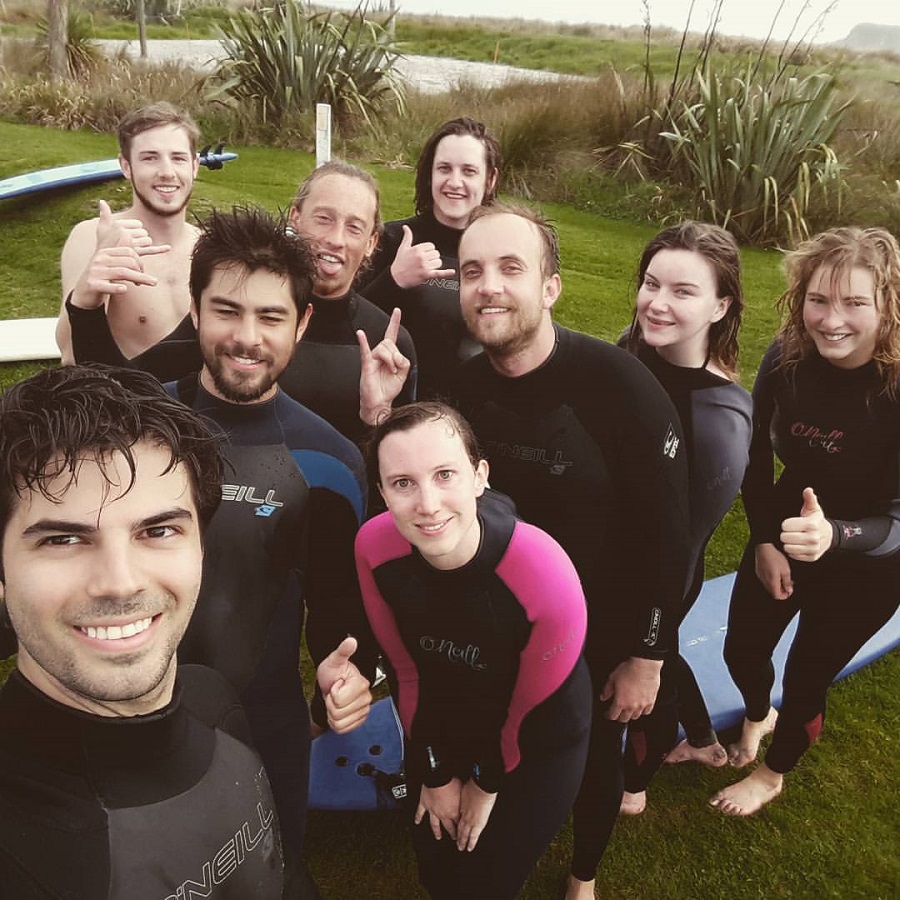
2. What did your family and community back home think of your decision at the time?
I think they supported me. Nobody was against my decision. They had known that I somehow always wanted to go back to Croatia. So, I think they were not so surprised by my decision. I think a lot of my friends or people who know me could understand my decision and see me somewhere else, but not in Stuttgart or Germany.

3. Where did you get your information about the realities of Croatia prior to coming?
I took part in n European pilot project called „ENAIP „between Croatia and Germany, where I was used to learning „Business-Croatian“, and I did a one-month internship in Zagreb. This gave me my first real experiences and ideas of life in Croatia. A few years later, I got a one-year scholarship from the Croatian government for the "CROATICUM" program, and I could improve my Croatian language skills at the Faculty of Philosophy in Zagreb but also catch more contacts and experience in Croatia. After this one year, I did a second internship in Zagreb. I worked for several months for the Croatian-German chamber of commerce and gain more professional experience in Croatia.
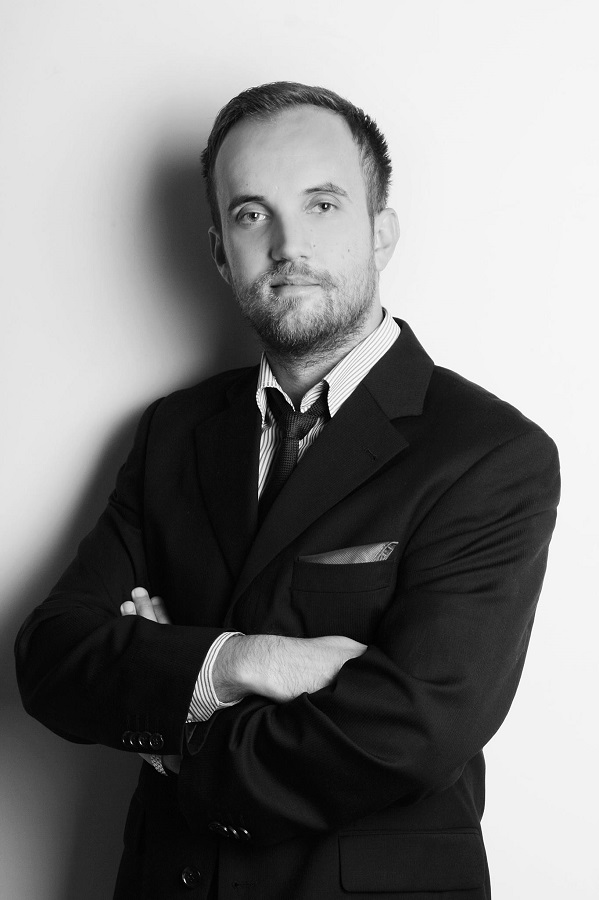
4. What were you most nervous about making the switch? What was your biggest fear, and what was the reality of what you found?
Would I find a proper job in my job field? Would I be happy with the salary, and could I survive financially? What are the possibilities later if I would like to change my career maybe? The more you are proactive, entrepreneurial, flexible or creative the more you will be successful and happy in Croatia.

5. Think back to the time before you arrived. What were your perceptions about Croatia, and how were they different from the reality you encountered?
Time before I arrived: Nice lifestyle in Croatia, being home, sunny and warm. Nice people, in many things not well-developed and corrupt but also high potential. Uncertainty in the matter of finding a proper and good job and having a regular good income
The reality today: more flexible and possibilities for myself than I thought - I can live in Zagreb as well as in Hvar. It's possible to find a good job in Croatia - you have only to be more proactive and entrepreneurial. I have got more of a sense of freedom and satisfaction as well as that I think that I really do what I love. Higher life quality than I thought.
6. You are still here, so obviously, the pros outweigh the cons. Tell us about some of the things that you love about being in Croatia, as well as some of the things you don't like.
I appreciate the feeling of being really at home in my country, surrounded by a similar mentality and people like yourself.
I love to go for Coffee whenever and wherever I want with friends to hang around and communicate with people or go alone and read newspapers (nobody will look at you like a stranger for that!)
What I also appreciate is the fact that everything is close and reachable for me in Croatia: The sea, the mountains, and the interior are not so far from Zagreb or other European capitals, and I can do my work as a journalist but also can go for a couple of days to Hvar to pick some olives for example.
From a German perspective, everything is far away. In Germany, I always had the feeling that I was like a bird in a gold cage. I didn't miss anything, but everything was over-restricted and less possible. In Croatia, meanwhile, I am feeling like a bird flying in freedom.
The point I really don't like is the passiveness of the people in Croatia. Things in Croatia can be better if we struggle for it or try to change it or show our dissatisfaction as citizens than just sitting in coffee bars and complaining and doing nothing.
Another negative thing is the bureaucracy in Croatia, or I would better say the unmotivated and incompetent people who are working in administrative departments or agencies. You have to deal with them, knowing that it will be frustrating, and in the end, you have to do their job.
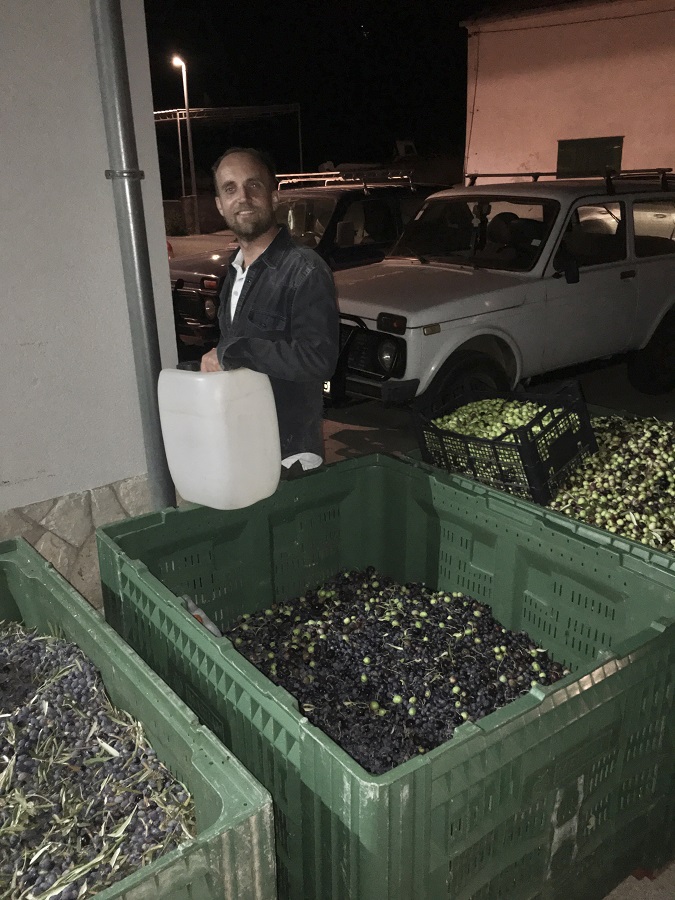
7. What advice do you have for others thinking about making a move from the diaspora?
Be open and flexible. Be aware that you maybe will not work in your specific field and that you were used to working in your host country. But in my opinion, Croatia offers a lot of potentials where everybody could find a niche for himself. If you know German, this is a big plus in Croatia. It is useful in each segment of the job market in Croatia.
Try to inform yourself before you go to live in Croatia. At best, try to get your information on the ground, try to contact people in Croatia and go for a coffee with them, Be socially able and spread out your network and connection. Go for a coffee, go for a coffee, go for a coffee...
In my view, everybody with a good school education and knowledge of the German language can find a proper job in Zagreb. You have to be more proactive and have initiative and rely less on the state and society.
With new internet technologies, you have far more possibilities to work on something and earn a salary. You can live nowadays as a digital nomad. Find an employer other than the internet in Germany, but live your life in Croatia.
And the end, no risk – no fun. Just try it. If it’s not worked out for you, you can later say I tried at least, and you will not regret it.
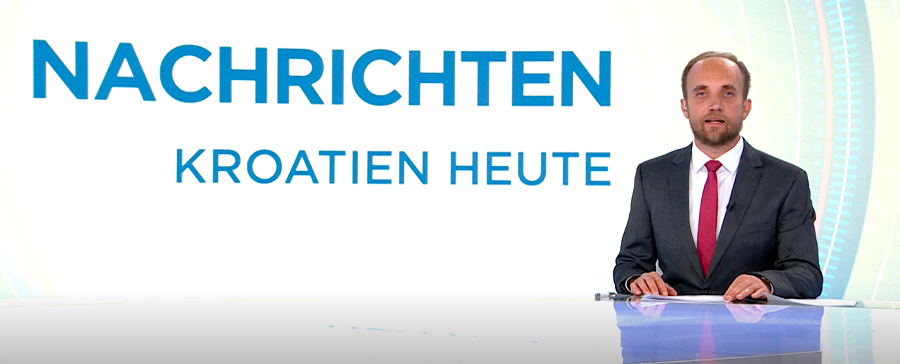
8. How do you think Croatia can better assist those who are looking to return to the Homeland?
Provide better and adequate information about Croatia and the job opportunities for somebody who is willing to return to the homeland. Reduce uncertainty. Try to make this move for them easier and more comfortable. More practical information, for example: How to deal with health insurance in Croatia?
The CROATiCUM institute should not only be a language centre, but it should also be an information point with practical advice and help for returnees as well. As it could be a cultural centre in the world for promoting Croatian culture in general, similar to Goethe Institute in Germany.
Maybe get a special adviser from the city of Zagreb or from some Croatian ministry to give assistance to returnees.
****
Thanks, Tonci, and good luck with https://glashrvatske.hrt.hr/de/blog/ruckkehr-nach-kroatien
https://greendealhr.podbean.eu/
https://glashrvatske.hrt.hr/de
****
You can follow the TCN Croatian Returnees series here.
****
What is it like to live in Croatia? An expat for 20 years, you can follow my series, 20 Ways Croatia Changed Me in 20 Years, starting at the beginning - Business and Dalmatia.
Follow Paul Bradbury on LinkedIn.
Croatia, a Survival Kit for Foreigners is now available on Amazon in paperback and on Kindle.



